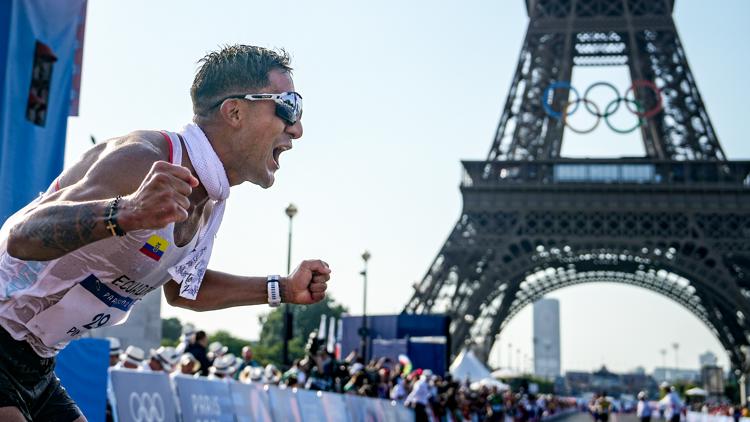PARIS, France — Tug of wars, live-pigeon shooting and single synchronized swimming were among the absurd Olympic sports throughout time.
The 2020 Tokyo Olympics introduced new sports like climbing, skateboarding, karate and surfing. The 2024 Paris Games are introducing breaking.
But they were far from weirdest events at the Games.
Race walking
A swift swinging of the hips and a powerful stride are necessary for the sport. However, unlike other track and field events, the walk isn't about speed, rather a perfected technique.
Per the race rules, one foot must be on the ground at all times and must be visible to the human eye. If both feet lose contact with the ground, it's considered "lifting." Judges are vigilant for anyone who breaks form while striding; any violations of "lifting" or knee bending result in a penalty.
Judges are alongside the athletes and wave paddles in front of athletes who break form or lose contact with the ground. Three paddle warnings mean athletes are out and disqualified.
The sport, introduced in 1904 at the St. Louis Olympics, used to be part of a decathlon equivalent called the "All-Around Championship."


Modern Pentathlon
Modeled after the pentathlon in the Ancient Olympic Games, the modern pentathlon consists of five events.
The competition encompasses the ideal skills of a soldier by competing in fencing, swimming, showjumping and a laser run -- a combined event of pistol shooting and a 3,200m cross-country run.
It was part of the 1912 Olympics and maintained a stronghold in the event lineup for the Games. The modern pentathlon would take place over several days, much like the decathlon and heptathlon. Since the 1996 Atlanta Game, it is a one-day event.
Table tennis
Table tennis, Ping-Pong's professional and more successful sibling, was introduced to the Olympics in 1988 at the Seoul Games. Traditionally, the game consisted of men's and women's singles and team events, but the 2020 Tokyo Olympics introduced a mixed doubles event.
The game follows the principles of tennis, hence the name, but has a different scoring system. Per the game rules, the match begins with a coin-toss in which the winner can serve the ball first, receive it, or choose the side of the table.
According to the official Olympics page, players must score 11 points to win the match. If there's a 10-10 stalemate, the player must have a two-point lead to defeat.
The game has many aliases, including ping pong, "whiff waff," and "flim-flam" -- all stemming from the sounds of the ball being hit. For professional athletes, however, there is only table tennis.
Only time will tell what weird and quirky sports will make their way onto the Olympic roster. Perhaps tug of war will make a comeback.



